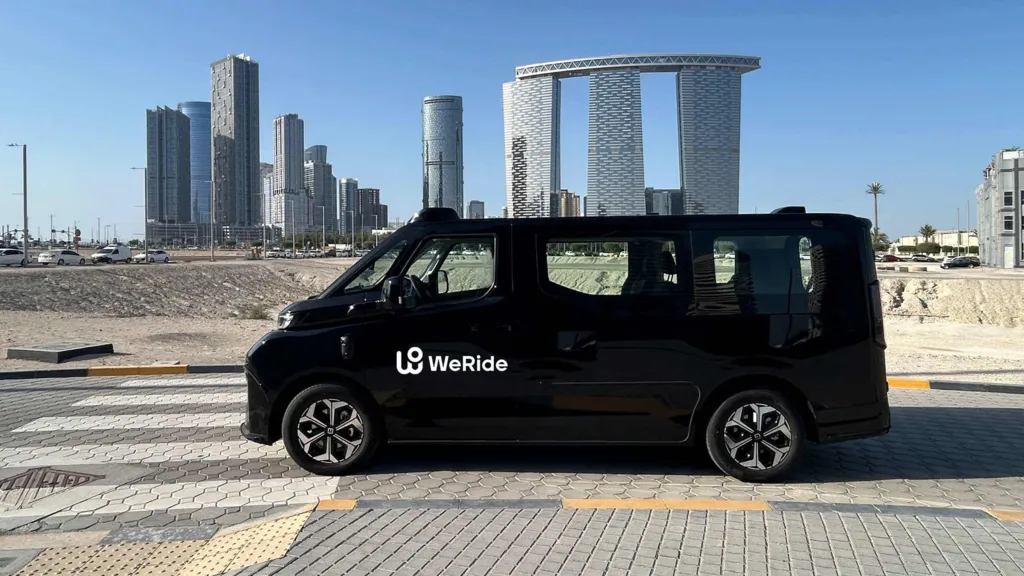Abu Dhabi Robotaxi Market Logs 30,000+ Trips and Expands Across Five Zones
Abu Dhabi’s autonomous mobility program has moved beyond pilot trials into full-scale deployment. With 44 autonomous vehicles now operating across Yas Island, Saadiyat, Masdar City, Al Reem, and Al Maryah, the Abu Dhabi Robotaxi Market has completed over 30,000 trips to date. These figures reflect not just operational maturity but a strategic shift in how the emirate approaches urban transport.
The fleet’s expansion over the past 12 months, tripling in size; signals readiness for broader integration. Officials aim for one in four city trips to be autonomous by 2040, a target that reflects both technological feasibility and policy ambition. The vehicles are coordinated through mobile apps that handle bookings and payments, making the experience seamless for residents and visitors alike.
Mubadala’s Investment in Waymo Strengthens Abu Dhabi’s Global Position
A key differentiator in the Abu Dhabi Robotaxi Market is its direct investment in autonomous technology. Mubadala, the emirate’s sovereign wealth fund, has participated in two of Waymo’s three funding rounds since 2020. Waymo, a Google spin-off, operates a fleet of 1,500 Jaguar i-Pace electric vehicles across five major U.S. cities, completing approximately 250,000 autonomous journeys per week.
Waymo’s vehicles are equipped with lidar sensors, radar, 29 cameras, and server-grade onboard computing. Each unit reportedly costs $200,000, reflecting the sophistication of the technology. Abu Dhabi’s alignment with Waymo gives it access to one of the most advanced robotaxi platforms globally, reinforcing its long-term commitment to safety, scalability, and commercial viability.
Multi-Operator Model Powers the Abu Dhabi Robotaxi Market
Abu Dhabi’s robotaxi ecosystem is built on a multi-operator model that includes TXAI, WeRide, Uber, and Tawasul Transport. TXAI, developed by Bayanat, launched the first autonomous taxi trials on Yas Island. WeRide expanded services to Al Reem and Al Maryah Islands, while Uber was integrated into the platform in late 2024. Local transport partner Tawasul supports operations in high-traffic zones.
This layered approach allows Abu Dhabi to scale services while maintaining flexibility. All operators function under the regulatory oversight of the Integrated Transport Centre (ITC), which enforces international safety standards and ensures interoperability across the fleet.
Safety and Certification Drive Public Trust and Operational Readiness
Safety is central to the Abu Dhabi Robotaxi Market. Globally, 94% of road accidents stem from human error — a variable that autonomous systems aim to eliminate. In Abu Dhabi, every vehicle undergoes rigorous testing, international certification, and approval from local safety authorities before deployment.
During trial phases, trained safety operators remain onboard to monitor performance. The ITC’s control centers track fleet activity in real time, ensuring that every trip meets reliability benchmarks. This process builds public trust and supports the gradual rollout into more complex urban environments.
Residential Rollout Planned Over 3–5 Years
While current operations focus on flagship destinations, the next phase involves expanding into residential zones. Over the next three to five years, the Abu Dhabi Robotaxi Market will integrate into everyday city life, offering autonomous rides for medical appointments, errands, and daily commutes.
Officials anticipate that by 2040, 25% of all trips in Abu Dhabi will be powered by autonomous transport. This includes not only robotaxis but also smart buses and delivery robots, all coordinated through unified digital platforms.
Regional Context: Strategic Control Sets Abu Dhabi Apart
Though other Gulf nations have invested in autonomous mobility, Abu Dhabi’s approach offers greater strategic control. Saudi Arabia’s Public Investment Fund holds a stake in Uber, which no longer develops its own autonomous systems. In contrast, Abu Dhabi’s direct investment in Waymo and its multi-partner deployment model provide both technological depth and operational resilience.
This distinction matters. Without owning the underlying technology, ride-hailing platforms remain dependent on external providers. Abu Dhabi’s model ensures that the emirate retains influence over safety standards, data governance, and long-term scalability.
Robotaxis Enable Inclusive and Efficient Urban Mobility
At its core, the Abu Dhabi Robotaxi Market is designed to serve everyone, not just tech adopters. Autonomous rides offer independence for seniors and people of determination, who may not hold driving licenses. Families can summon driverless taxis for school runs or medical visits, while logistics firms benefit from 24/7 delivery capabilities without driver fatigue.
These use cases demonstrate how autonomous mobility can solve real-world challenges, making transport safer, more accessible, and more efficient.
Autonomous Week to Showcase Abu Dhabi’s Mobility Vision
From November 10–15, Abu Dhabi Autonomous Week will spotlight the emirate’s progress. The DRIFTx exhibition will showcase autonomous solutions across land, sea, and air. RoboCup Asia-Pacific 2025 will bring AI-driven robotics competitions to the region, while the Autonomous Racing League will demonstrate high-performance autonomous vehicles in action.
These events reflect Abu Dhabi’s commitment to innovation, safety, and sustainability. The Abu Dhabi Robotaxi Market will be a central theme, reinforcing the emirate’s leadership in smart mobility and its readiness for global collaboration.
Also Read: From Yas to Al Reem: Abu Dhabi’s Autonomous Fleet Triples Fast








